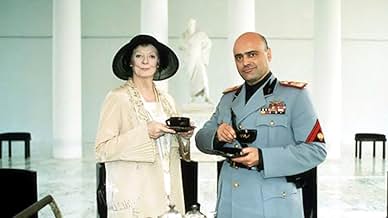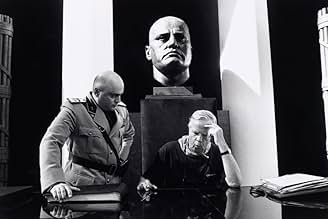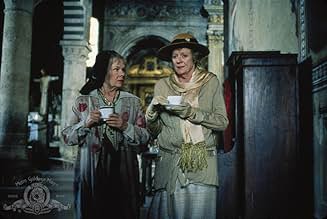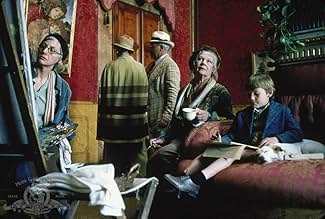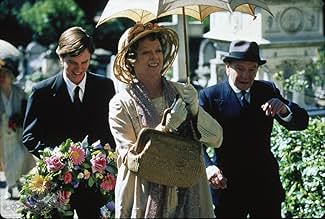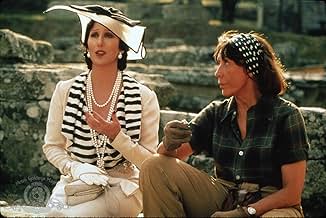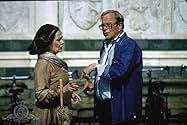IMDb रेटिंग
6.9/10
15 हज़ार
आपकी रेटिंग
अपनी भाषा में प्लॉट जोड़ेंAn orphaned Italian boy is raised amongst a circle of British and American women living in Mussolini's Italy before and during World War II.An orphaned Italian boy is raised amongst a circle of British and American women living in Mussolini's Italy before and during World War II.An orphaned Italian boy is raised amongst a circle of British and American women living in Mussolini's Italy before and during World War II.
- 1 BAFTA अवार्ड जीते गए
- 5 जीत और कुल 3 नामांकन
फ़ीचर्ड समीक्षाएं
I had wanted to see this film for some time and when the opportunity finally materialised I was enthralled. It is probably the best performance I have seen by Maggie Smith, who often seems to be playing the same character actually. But this is her best since Miss Jean Brodie, and Joan Plowright, Judi Dench, Lily Tomlin and Cher are all equally impressive.
The settings are skilfully designed to draw the viewer in, and when you are setting your movie in Florence and its environs you can't go wrong anyway. The ongoing clash between two worlds i.e. Lady Hester Random (Maggie Smith) versus Elsa (Cher) reaches a satisfying resolution which it would be unfair to reveal.
There are splendid comic vignettes mixed into the overall drama. Judi Dench and her dog being thrown out of the cathedral, sharply contrasts with the chilling moment when the Jewish arts professor is taken away by the Gestapo. Understated but none the less effective, probably more so, because of it.
If you haven't seen this film, see it as soon as you can.
The settings are skilfully designed to draw the viewer in, and when you are setting your movie in Florence and its environs you can't go wrong anyway. The ongoing clash between two worlds i.e. Lady Hester Random (Maggie Smith) versus Elsa (Cher) reaches a satisfying resolution which it would be unfair to reveal.
There are splendid comic vignettes mixed into the overall drama. Judi Dench and her dog being thrown out of the cathedral, sharply contrasts with the chilling moment when the Jewish arts professor is taken away by the Gestapo. Understated but none the less effective, probably more so, because of it.
If you haven't seen this film, see it as soon as you can.
This film is one of the most touching and lovely films that I have seen in many years. Its gaggle of actresses are second to none and turn out excellant performance, Joan Plowright in particular brings an irresistable sweetness to the role. People who have commented on the film so far seem to have neglected to mention the soundtrack which is beautiful and inspiring with a wonderful piano piece. Criticism that the film is too old fashioned or that the characters are unappealing and pompous seems to miss the point, the very charm of Hester (Maggie Smith in particular)is how she overcomes her snobbery at the end and realises how much Elsa (Cher, who in any other film would doubtless be misplaced but in this case fits the role like a glove) has done for the Scorpioni. In short the film is a relic of a gentler age and is simultaniously uplifting, upsetting and relaxing. I implore everyone to hunt down the soundtrack on CD to the ends of the earth if necissary.
This is a melodrama and you should not expect anything else. But what a melodrama! In the hands of a great director, using an eccentric story involving some eccentric people, it conveys straight to the heart how the great darkness descended upon Europe in the 1930's. It tells you that the greatest evil is the work of humans, and that the potential for evil lurks in the human soul. But, and here is the movie greatest strength, it shows you that humans possess the capacity to be human and to act human, when they heed Shakespeare's advice: "Love thyself last". All the negative comments that can be made about this or that deficiency caused me to downgrade this movie's rating from a "10" to a mere "9". Go see it. If you have kids - make sure to take them along for a great and satisfying lesson about life as it should be lived.
This is a very European movie. Whereas Hollywood overstates, Europe understates. The story is based on the autobiography of Franco Zeffirelli, born in 1922, who became a prominent Italian stage director and achieved world fame as a director of filmed stage pieces such as "Romeo and Juliet," "Hamlet, and "La Traviata." The film deals with the years 1935-44. After the death of his mother Zeffirelli, or Luca in the film, an illegitimate child more or less rejected by his father, was looked after by a group of eccentric art-loving English ladies who had made Florence their home - on their terms. The locals call them the "Scorpioni" - a tribute to their acid tongues. When Mussolini declared war on Britain in 1940, the ladies were interned in a beautiful mountaintop village near Florence, guarded by a couple of long-suffering policeman, their lifestyle of sketching, painting, art appreciation and fine dining scarcely changing.
The setting is the Florentine treasure troves of Tuscan art, the Uffizi, Il Duomo and the Academy. The English are led by three grand dames of the theatre, Joan Plowright as Arabella, Luca's chief protector, Maggie Smith, and Judy Dench (with her real life husband Michael Williams in a supporting role as the British consul.). Then there are two equally larger than life Americans, a retired but still glamorous movie star played by Cher, and a bike-riding lesbian archaeologist played by Lily Tomlin. Most of the Italian characters are overshadowed by all this Anglo ego. (Or maybe it's just poor dubbing, or John Mortimer's part in the scriptwriting). The two boys playing Luca at different ages are good looking but the older one in particular is a bit vacuous, and Cher's impossibly handsome Italian boyfriend puts in a wooden performance.
There are a couple of plot-lines (will Cher escape the Jewish round-up, will the ladies make it through the war OK) and the occasional funny scene but the interest is really in the characters. Not that all of them are particularly attractive people. Maggie Smith's Lady Hester, widow of a former British Ambassador to Italy, is a dreadful old snob with hardly any brains who likes the fascists and has scarcely a good word for anybody else except her late husband. She engineers the tea party with Il Duce, fondly imagining that Mussolini himself will ensure the ladies' safety in Florence. A few days later the local fascists tip them out of the Uffizi gallery where they were accustomed to take tea while they sketched the old masters. Yet at the end she does show a little genuine good grace when she intervenes to help Cher.
It's a curious piece, reminiscent of "Life is Beautiful" - a light comedy with a deadly serious titanic struggle between good and evil going on in the background, a background which seems altogether too gorgeous to accommodate such evil. Good, represented by a Scottish major, triumphs in the end, only to be put in his place by the Scorpioni. Zeffirelli here pays his artistic and personal debt to them. Wacky though they were, the Scorpioni did know the difference between good and evil, or at least the difference between good art and bad art, and they taught Zeffirelli well.
The setting is the Florentine treasure troves of Tuscan art, the Uffizi, Il Duomo and the Academy. The English are led by three grand dames of the theatre, Joan Plowright as Arabella, Luca's chief protector, Maggie Smith, and Judy Dench (with her real life husband Michael Williams in a supporting role as the British consul.). Then there are two equally larger than life Americans, a retired but still glamorous movie star played by Cher, and a bike-riding lesbian archaeologist played by Lily Tomlin. Most of the Italian characters are overshadowed by all this Anglo ego. (Or maybe it's just poor dubbing, or John Mortimer's part in the scriptwriting). The two boys playing Luca at different ages are good looking but the older one in particular is a bit vacuous, and Cher's impossibly handsome Italian boyfriend puts in a wooden performance.
There are a couple of plot-lines (will Cher escape the Jewish round-up, will the ladies make it through the war OK) and the occasional funny scene but the interest is really in the characters. Not that all of them are particularly attractive people. Maggie Smith's Lady Hester, widow of a former British Ambassador to Italy, is a dreadful old snob with hardly any brains who likes the fascists and has scarcely a good word for anybody else except her late husband. She engineers the tea party with Il Duce, fondly imagining that Mussolini himself will ensure the ladies' safety in Florence. A few days later the local fascists tip them out of the Uffizi gallery where they were accustomed to take tea while they sketched the old masters. Yet at the end she does show a little genuine good grace when she intervenes to help Cher.
It's a curious piece, reminiscent of "Life is Beautiful" - a light comedy with a deadly serious titanic struggle between good and evil going on in the background, a background which seems altogether too gorgeous to accommodate such evil. Good, represented by a Scottish major, triumphs in the end, only to be put in his place by the Scorpioni. Zeffirelli here pays his artistic and personal debt to them. Wacky though they were, the Scorpioni did know the difference between good and evil, or at least the difference between good art and bad art, and they taught Zeffirelli well.
Another Judi Dench film that in no way disappoints.
This film opens the mind even more to that important chapter in history and lets you look from various perspectives at events.
I found it a really fascinating film, absolutely beautiful cinematography.
Excellent story telling, narrative, really well paced and put across.
And wonderfully acted across the board, from main characters to all the supporting cast, I did not realise Cher was such a good actress.
Stories like this based on fact, are so wonderful.
And the movie captures Florence, so pleasingly, you will long to visit.
A welcome break from the mindless action flicks.
This film opens the mind even more to that important chapter in history and lets you look from various perspectives at events.
I found it a really fascinating film, absolutely beautiful cinematography.
Excellent story telling, narrative, really well paced and put across.
And wonderfully acted across the board, from main characters to all the supporting cast, I did not realise Cher was such a good actress.
Stories like this based on fact, are so wonderful.
And the movie captures Florence, so pleasingly, you will long to visit.
A welcome break from the mindless action flicks.
क्या आपको पता है
- ट्रिवियाCher has stated that the only reason she took the part of Elsa was because Writer and Director Franco Zeffirelli said he could only see her and no other actress in the role.
- गूफ़The tanks the Germans ride in are, in fact, U.S. Army M4 Shermans, not German-built Panzers.
- भाव
Lady Hester: The Germans and the Italians couldn't get rid of us. There is absolutely no reason why we should surrender to the Scots.
- इसके अलावा अन्य वर्जनThe MGM DVD, ISBN 0-7928-4300-2, is missing least one shot: The original tea with Mussolini scene ends with Mussolini forcing himself upon the reporter, forcing her onto his desk (i.e., he rapes her.) This DVD omits that ending and leaves the reporter's change in behavior unexplained.
- साउंडट्रैकMattinata Fiorentina
Written by Giovanni D'Anzi (as D'Anzi) and Michele Galdieri (as Galdieri)
Performed by Alberto Rabagliati
टॉप पसंद
रेटिंग देने के लिए साइन-इन करें और वैयक्तिकृत सुझावों के लिए वॉचलिस्ट करें
- How long is Tea with Mussolini?Alexa द्वारा संचालित
विवरण
- रिलीज़ की तारीख़
- कंट्री ऑफ़ ओरिजिन
- आधिकारिक साइट
- भाषाएं
- इस रूप में भी जाना जाता है
- Tea with Mussolini
- फ़िल्माने की जगहें
- उत्पादन कंपनियां
- IMDbPro पर और कंपनी क्रेडिट देखें
बॉक्स ऑफ़िस
- बजट
- $1,20,00,000(अनुमानित)
- US और कनाडा में सकल
- $1,44,01,563
- US और कनाडा में पहले सप्ताह में कुल कमाई
- $16,33,183
- 16 मई 1999
- दुनिया भर में सकल
- $1,44,01,563
- चलने की अवधि1 घंटा 57 मिनट
- रंग
- ध्वनि मिश्रण
- पक्ष अनुपात
- 1.85 : 1
इस पेज में योगदान दें
किसी बदलाव का सुझाव दें या अनुपलब्ध कॉन्टेंट जोड़ें



